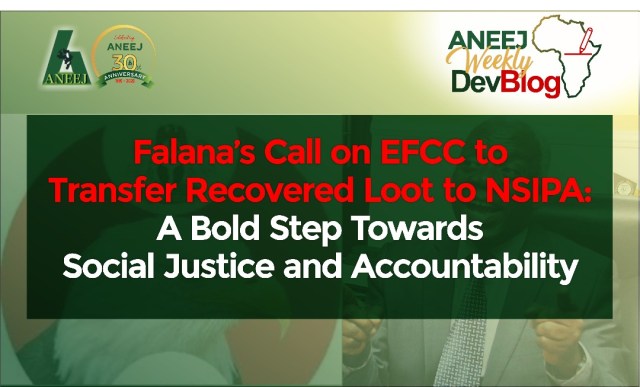
Falana’s Call on EFCC to Transfer Recovered Loot to NSIPA: A Bold Step Towards Social Justice and Accountability
Renowned human rights lawyer and activist, Femi Falana (SAN), has once again spoken truth to power by urging the Economic and Financial Crimes Commission (EFCC) to transfer the recently recovered ₦32.7 billion and $445,000—funds allegedly looted by officials of the Ministry of Humanitarian and Poverty Alleviation—to the National Social Investment Programme Agency (NSIPA).
This call comes at a critical time, when Nigeria’s social protection system is in dire need of increased transparency, credibility, and most importantly—resources.
Under the leadership of its current chairman, the EFCC has shown renewed vigor and commitment to tackling corruption, especially in the management of funds earmarked for the most vulnerable Nigerians. The recovery of such large sums is commendable and represents an opportunity to restore public trust in government institutions and anti-corruption efforts.
Falana’s call is not merely a legal argument—it is a moral imperative. Returning these recovered funds to NSIPA, the agency responsible for implementing key social investment programmes, would help realign resources back to their original purpose: fighting poverty and supporting vulnerable citizens.
President Bola Tinubu’s administration should see this moment as a unique opportunity to reinforce its commitment to poverty alleviation and social protection. Redirecting recovered loot to fund programmes such as the Conditional Cash Transfers, School Feeding Programme, N-Power, and other social investment schemes would have a direct and measurable impact on the lives of millions of Nigerians.
Moreover, this approach aligns perfectly with global best practices that advocate for the restitution of stolen public assets into their original development purposes.
However, redirecting funds alone is not enough. For these resources to truly deliver value, strong monitoring, accountability, and transparency mechanisms must be put in place. The EFCC, along with other anti-corruption bodies such as the ICPC and the Code of Conduct Bureau, should intensify their oversight on how these funds are disbursed and utilized within NSIPA and related programmes.
This also presents an opportunity for civil society organizations (CSOs) to step up.
To ensure that budgetary allocations and recovered funds are not lost to fresh rounds of mismanagement, CSOs must apply proven accountability frameworks such as the MANTRA model developed by the Africa Network for Environment and Economic Justice (ANEEJ).
The Monitoring of Recovered Assets Through Transparency and Accountability (MANTRA) project has been effective in tracking the use of returned loot from the Abacha era, ensuring it reached the targeted beneficiaries. Adapting this model to monitor new disbursements through NSIPA can help:
• Track spending in real time
• Provide independent verification of beneficiaries
• Offer feedback loops between communities and government
• Deter future corruption through increased public scrutiny
Femi Falana’s bold call is more than a legal directive—it is a roadmap toward restoring integrity in Nigeria’s social protection system. The EFCC’s success in recovering funds should be the beginning, not the end. What follows next is just as important: ensuring those resources reach the people who need them most.
By transferring the funds to NSIPA, ensuring close monitoring through collaboration with civil society, and scaling up investments in social protection, the Tinubu administration can seize this moment to make a lasting impact on the fight against poverty in Nigeria.
His request is valid and it is common sense to put back the money from where it was taken from. Other recovered stolen funds from foreign banks are being put into NSIP, then why not…?
NSIP has made impacts on the masses across the nation, especially the HoPE program of cash transfers. More Households needs to be reached and targeted upscaled. The money is meant for the masses and to them it should go.